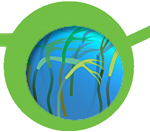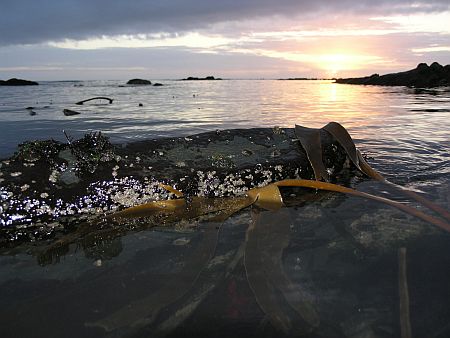Marine Biodiversity
Background
 Kelp forests are key components of coastal Atlantic ecosystems and contribute greatly to species richness, functioning as a reserve of biodiversity. These are highly productive ecosystem engineers of rocky cold-water marine coastlines, hosting an enormous diversity of species, including fish, mammals, invertebrates, other seaweeds and epibiota. Many of these organisms are linked to the presence of kelp species through a variety of trophic and habitat associations.
Kelp forests are key components of coastal Atlantic ecosystems and contribute greatly to species richness, functioning as a reserve of biodiversity. These are highly productive ecosystem engineers of rocky cold-water marine coastlines, hosting an enormous diversity of species, including fish, mammals, invertebrates, other seaweeds and epibiota. Many of these organisms are linked to the presence of kelp species through a variety of trophic and habitat associations.
This is the case of numerous species of fishes that use the kelp forests as feeding and nursery areas, and as a shelter from large predators. Overfishing, harvesting practices, diseases and several natural and climate-related factors are often pointed out as drivers of kelp forests trends and kelp deforestation is widespread in some regions of the globe. Whether for other regions there is reliable available information on kelp forest trends (Japan, United States, Chile) for European coast waters the available information is often fragmented and outdated.
These are highly policy relevant topics in the context of several European directives that take into consideration the conservation of marine habitats like the Water Framework Directive, the Marine Strategy Framework Directive, the Habitats Directive and its application to the Natura 2000 network.
Approach chosen
Different methodological approaches will be integrated to address specific sub-questions within the general identified question:
- The status and trends of kelp beds in Europe will be assessed through an expert consultation.
- The effects of kelp forest density and/or area on fisheries will be assessed through a systematic review.
Agenda 


Who is playing what role (according to prototype)?
- REQUESTERS: Scientific community, Environmental politicians at the European level
- KNOWLEDGE HOLDERS: Scientists, NGOs
- KNOWLEDGE HUBS: Euromarine, Diversitas, GEO BON, IUCN-Invasive Species Specialist Group
- NOK Knowledge coordination body: Isabel Sousa Pinto, Rita Araújo, Carlo Heip
- SCOPING GROUP: Isabel Sousa Pinto, Rita Araújo, Carlo Heip, Elisabeth Strain, Laura Airoldi, Ricardo Aguilar, Laurent Lévèque, Trine Bekkby, Inka Bartsch, Jorge Assis, José Rico
- AD-HOC WORKING GROUPS:
- Systematic review: Isabel Sousa Pinto, Rita Araújo, , Inka Bartsch, José Rico, Karim Erzini, Trine Bekkby
- Expert consultation: Isabel Sousa Pinto, Rita Araújo, Araceli Puente, Elisabeth Strain, Christian Wienckle, Consolacion Fernandez, Dominique Daveau, François Gevaert, Fredriksen Stein, Hartvig Christie, Hendrik Schubert, Ignácio Barbara, Inka Bartsch, Jorge Assis, José Rico, Laura Airoldi, Karsten Dahl, Louise Scally, Mathew Dring, Michael Burrows, Myriam Valero, Nova Mieszkowska, Ricardo Aguilar, Sandrine Derrien, Trine Bekkby
Useful links
